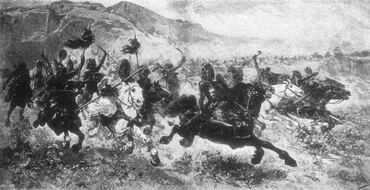1
`When there is a strife between men, and they have come nigh unto the judgment, and they have judged, and declared righteous the righteous, and declared wrong the wrong-doer,
2
then it hath come to pass, if the wrong-doer is to be smitten, that the judge hath caused him to fall down, and [one] hath smitten him in his presence, according to the sufficiency of his wrong-doing, by number;
3
forty [times] he doth smite him -- he is not adding, lest, he is adding to smite him above these -- many stripes, and thy brother is lightly esteemed in thine eyes.
4
`Thou dost not muzzle an ox in its threshing.
5
`When brethren dwell together, and one of them hath died, and hath no son, the wife of the dead is not without to a strange man; her husband's brother doth go in unto her, and hath taken her to him for a wife, and doth perform the duty of her husband's brother;
6
and it hath been, the first-born which she beareth doth rise for the name of his dead brother, and his name is not wiped away out of Israel.
7
`And if the man doth not delight to take his brother's wife, then hath his brother's wife gone up to the gate, unto the elders, and said, My husband's brother is refusing to raise up to his brother a name in Israel; he hath not been willing to perform the duty of my husband's brother;
8
and the elders of his city have called for him, and spoken unto him, and he hath stood and said, I have no desire to take her;
9
`Then hath his brother's wife drawn nigh unto him, before the eyes of the elders, and drawn his shoe from off his foot, and spat in his face, and answered and said, Thus it is done to the man who doth not build up the house of his brother;
10
and his name hath been called in Israel -- The house of him whose shoe is drawn off.
11
`When men strive together, one with another, and the wife of the one hath drawn near to deliver her husband out of the hand of his smiter, and hath put forth her hand, and laid hold on his secrets,
12
then thou hast cut off her hand, thine eye doth not spare.
13
`Thou hast not in thy bag a stone and a stone, a great and a small.
14
Thou hast not in thy house an ephah and an ephah, a great and a small.
15
Thou hast a stone complete and just, thou hast an ephah complete and just, so that they prolong thy days on the ground which Jehovah thy God is giving to thee;
16
for the abomination of Jehovah thy God [is] any one doing these things, any one doing iniquity.
17
`Remember that which Amalek hath done to thee in the way, in your going out from Egypt,
18
that he hath met thee in the way, and smiteth in all those feeble behind thee (and thou wearied and fatigued), and is not fearing God.
19
And it hath been, in Jehovah thy God's giving rest to thee, from all thine enemies round about, in the land which Jehovah thy God is giving to thee -- an inheritance to possess it -- thou dost blot out the rememberance of Amalek from under the heavens -- thou dost not forget.







